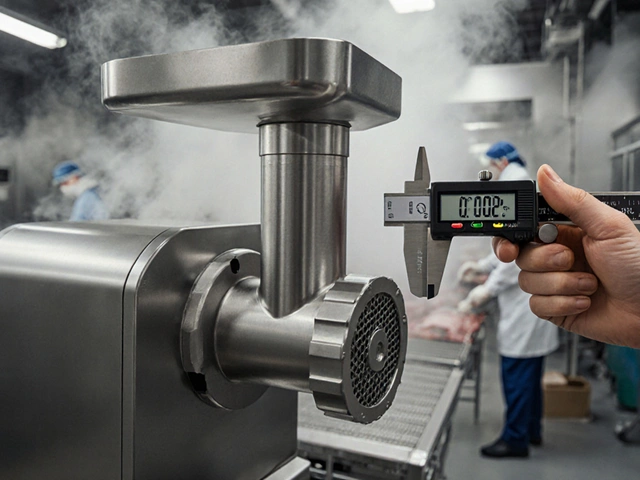
Entrepreneurship offers a unique thrill, especially when it involves something as hands-on and practical as small scale manufacturing. This venture might not require as much capital as large factories, but it demands creativity, resilience, and a close connection to the community. Imagine crafting artisanal soap in a quaint studio or designing tailored furniture that speaks the language of modern elegance.
What makes small scale manufacturing enticing is its blend of local cultural essence with entrepreneurial spirit. From enhancing your local economy to providing unique products, these businesses can punch well above their weight class. Aspiring manufacturers can start by tapping into local markets, experimenting with materials, and creating distinctive products that tell a story. Here, we'll explore more about what these businesses entail, their advantages and obstacles, and how you might embark on your own manufacturing journey.
- Understanding Small Scale Manufacturing
- Examples of Small Scale Businesses
- Benefits and Challenges
- Steps to Start Your Own Manufacturing Venture
Understanding Small Scale Manufacturing
Small scale manufacturing is a universe that combines ingenuity with localized production, effectively bridging the gap between industrial-scale operations and home-based enterprises. It thrives on creating value from minimal resources, turning raw materials into unique products with a personal touch that resonates with local market needs. The charm of small scale manufacturing is its flexibility and intimacy, where the owners often wear multiple hats—creator, marketer, and distributor—all of which allow a close-knit connection to the process and the people involved.
The landscape of small scale manufacturing is as varied as it is colorful. One could delve into the niche of handcrafting natural soaps from locally sourced ingredients or delve into the aromatic world of small-batch coffee roasting. Each idea brings with it an opportunity to add a personal touch and to build a brand that is inherently unique. The success of such businesses often hinges on the ability to tell a compelling story—one that resonates with consumers and sets them apart in a crowded marketplace. As Maya Angelou once stated in the realm of creativity, "You can't use up creativity. The more you use, the more you have."
Additionally, these ventures often embody sustainability, using eco-friendly practices and materials that align with today’s increasing consumer consciousness about environmental impacts. A distinct advantage of small scale manufacturing lies in its capacity for personalized service and adaptation to the changing demands of a niche market. This agility, combined with a strong understanding of market trends and consumer behavior, allows small businesses to innovate rapidly and efficiently.
Small scale business owners can operate in virtually any industry, from food and beverage to fashion and accessories. They often begin with a focused idea that caters to specific consumer needs, leveraging social media to reach a broader audience and using e-commerce platforms to expand their market reach. Whether it's a bespoke jewelry designer crafting intricate pieces by hand or a tech-savvy entrepreneur producing custom 3D-printed gadgets, the potential for small scale manufacturing is boundless.
However, the journey isn't without its hurdles. One of the primary challenges is maintaining quality while scaling production. Entrepreneurs must carefully balance their growth ambitions with the consistency of their product offerings. Establishing a strong network of suppliers and managing operational costs is crucial, as access to capital is often limited when compared to larger manufacturers. Yet, overcoming these challenges is all part of the process, pushing small scale manufacturers to innovate persistently.
Statistics reveal that small scale manufacturers play a crucial role in economic growth. In countries across the globe, they contribute significantly to employment and GDP, often serving as the backbone of local economies. For those venturing into this realm, understanding regulatory requirements and ensuring compliance with industry standards are essential. With the right balance of creativity, resource management, and strategic marketing, small scale manufacturing can transform simple ideas into thriving businesses contributing immense value to the community.

Examples of Small Scale Businesses
Exploring the small scale business landscape can lead to uncovering some truly fascinating ventures. One such example is the production of homemade skincare products, which has been booming lately thanks to the increase in consumer demand for organic and natural products. Artisanal soap making, in particular, has gained substantial traction, capitalizing on both the trend of self-care and sustainability practices. Entrepreneurs in this niche often start by experimenting with natural ingredients like essential oils and plant extracts, crafting soaps that are tailored to specific skin needs. These products often become well-regarded due to their handcrafted quality and the personal touch that goes into each unique bar. An engaging aspect of this industry is its community-facing nature; soap makers often participate in local markets and fairs to build rapport with customers and fine-tune their offerings based on direct feedback from clients.
Another thriving sector within small scale manufacturing is the creation of artisanal chocolates. Leveraging local ingredients and distinctive recipes, chocolate makers are creating premium products that offer a sensory experience unlike traditional mass-produced chocolates. This involves a meticulous process from selecting the finest cocoa beans to mastering the delicate art of tempering chocolate to perfection. The demand for gourmet chocolates is increasing as people seek out products that align with their values concerning quality and ethical sourcing. Many brands take pride in being transparent about their supply chains, which resonates with an increasingly eco-conscious customer base. These small chocolate manufacturers not only provide a tempting assortment of flavors but also embed themselves deeply within their communities, often arranging tours and tasting sessions to engage with chocolate enthusiasts.
"When you think about sustainable chocolate, you're thinking about creating better conditions for everyone involved—from farmers to consumers," says Jeanne Vollenweider, a renowned chocolatier.
Bespoke furniture crafting is yet another domain where creativity and craftsmanship shine brightly. This industry appeals to those who appreciate personalized and custom-made items over mass-produced options. Artisans in this field draw from a deep well of traditional woodworking techniques while often infusing modern design elements. By focusing on creating pieces tailored to customer specifications, these businesses cater to a niche market that values the uniqueness and durability of their furniture. Many craftsmen choose to utilize locally-sourced timber, enhancing their commitment to sustainability. Through workshops and exhibitions, these craftspeople are able to display their skills and connect with a community that prizes artisanal quality.
These small scale businesses not only contribute economically by providing employment and encouraging local trade, but they also elevate cultural and artisanal values within communities. Whether it's by nurturing childhood nostalgies through homemade sweets or promoting an eco-friendly lifestyle with natural skincare, entrepreneurs in this realm hold a pivotal role in weaving the fabric of society's collective identity. Interested individuals can draw lessons from these examples, finding inspiration and guidance in their pursuit of crafting a thriving small scale business.

Benefits and Challenges
Embarking on a journey into small scale business is akin to riding a roller coaster of myriad experiences, each unique and fulfilling in its own right. One of the most appealing benefits of delving into small scale manufacturing ideas is the relatively low financial entry barrier compared to large-scale operations. Entrepreneurs can often start with minimal capital, using whatever resources they have at hand, which allows for a gradual scaling of operations as the business begins to take root and grow. These ventures often rely on local materials and labor, thereby keeping logistics simple and costs manageable. Crafting local production solutions can directly impact surrounding communities by stimulating job creation and fostering a sense of local pride.
Small scale manufacturers also enjoy significant flexibility that larger companies often lack. This adaptability allows them to respond swiftly to market changes and consumer preferences, often setting trends rather than following them. Consider the bespoke furniture industry, where manufacturers cater to niche markets by designing products specific to individual tastes and space requirements. This dynamic environment fosters innovation, enabling entrepreneurs to experiment with new ideas and improve their offerings. However, embracing continuous innovation is not without its hurdles. Market demands can be unpredictable, and maintaining a balance between creative autonomy and financial sustainability is essential.
The challenges, though, are as real as the opportunities. One of the primary hurdles is competing with established brands that enjoy economies of scale and vast distribution networks. Small scale operations might find it difficult to match the pricing and widespread marketing of larger competitors, which can lead to a struggle for visibility in the market. Furthermore, securing reliable and consistent access to resources, both material and human, plays a crucial role in sustaining operations. A study by the Small Business Administration highlights that approximately 50% of all small businesses fail within the first five years; hence, strategic planning and market research become vital components of success. "Success in small scale manufacturing doesn't only hinge on innovation," says industry expert John Marcus, "but also on crafting intricate relationships within your community and staying resilient through the business cycles."
To navigate these waters, entrepreneurs often rely on building a robust network of suppliers, partners, and loyal customers. Establishing personal connections with customers enables a level of trust and brand loyalty that can shield a business from the industry's volatile nature. This is where the role of startup tips becomes crucial—ensuring that every move is calculated and aimed at long-term sustainability rather than short-term gains. Leveraging social media and online platforms can further amplify reach, allowing small businesses to present their unique stories to a wider audience. With persistence and a dash of creativity, those in the industry not only survive but often flourish, becoming signature voices in their respective niches.

Steps to Start Your Own Manufacturing Venture
Diving into a small scale business in manufacturing is no small feat, but with the right approach and mindset, you can unlock the potential for success and community impact. Begin with thorough research to understand market demands and trends. Identifying a niche that aligns with your interests and expertise is crucial. Whether it's creating bespoke furniture or crafting artisanal chocolates, selecting a product that resonates with a target audience is the first pivot to make your idea come alive. Equally, it would benefit you to attend trade shows, network with industry experts, and immerse yourself in environments where your future customers exist.
Once you have a clear vision of what your business will produce, the next step is crafting a solid business plan. This document should outline your goals, operational plan, market analysis, and financial strategy. A comprehensive plan not only serves as a roadmap for your venture but is also instrumental in attracting potential investors or securing loans. Be honest and detailed with your financial projections, covering startup costs, operating expenses, and anticipated revenues. Pepper in a touch of flexibility to account for unforeseen challenges that may arise.
An essential component of this journey involves setting up the right infrastructure. Finding a suitable location, whether it's a garage, a rented space, or collaborating with an existing facility, hinges on factors like scale, budget, and resource availability. Equipping this location with the necessary machinery and resources shouldn’t be overly costly if you opt for second-hand equipment, which is often both reliable and economical. Likewise, source materials locally whenever feasible, as it saves on transportation costs and supports fellow businesses nearby.
Once physical setup is underway, securing permits and licenses cannot be overlooked. Every region will have its regulations when it comes to manufacturing ideas. Familiarize yourself with local laws concerning environmental impacts, business operations, and safety regulations. Partnering with a legal advisor can streamline this process, ensuring you're compliant and focused on growing your local production.
Marketing your brand is where the magic happens. In today’s digital age, a strong online presence can amplify your reach exponentially. Utilize platforms that resonate with your target audience, coupled with storytelling that embodies the essence of your product and brand. Developing an engaging website, maintaining active social media channels, and leveraging digital marketing strategies align your business with modern consumer habits. Don’t shy away from traditional marketing, as community engagement through local events and word-of-mouth can similarly enhance visibility.
"The best way to predict the future is to invent it." — Alan Kay
Finally, launch with care. A soft launch can be invaluable by providing a testing ground for your product and operations on a smaller scale, gathering initial consumer feedback before an official opening. This phase encourages iterative improvements and relationship building with early adopters. Keep an ear to the ground for real-time insights, which can play a pivotal role in fine-tuning your offerings for greater market fit and success.




